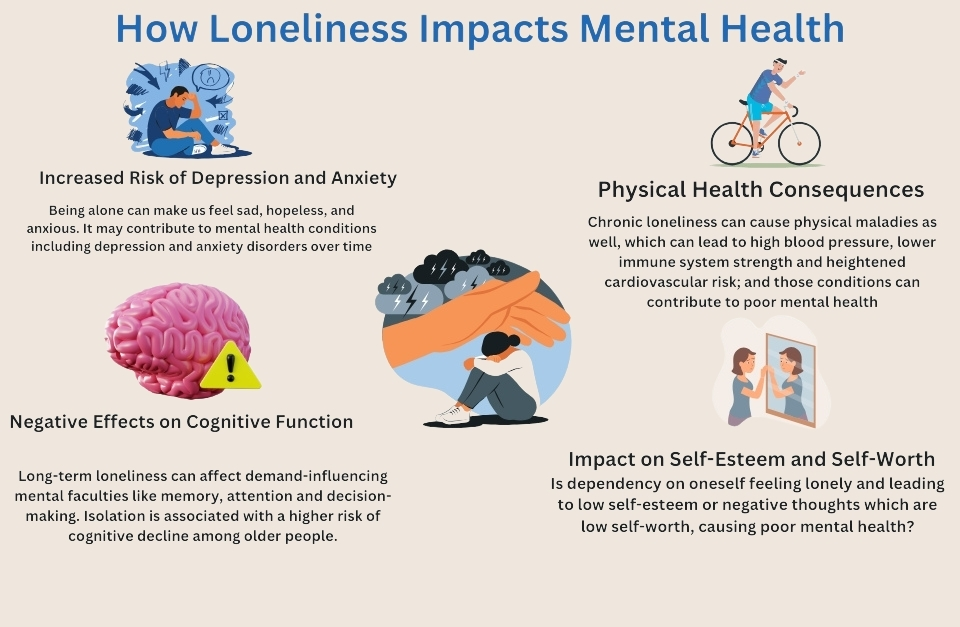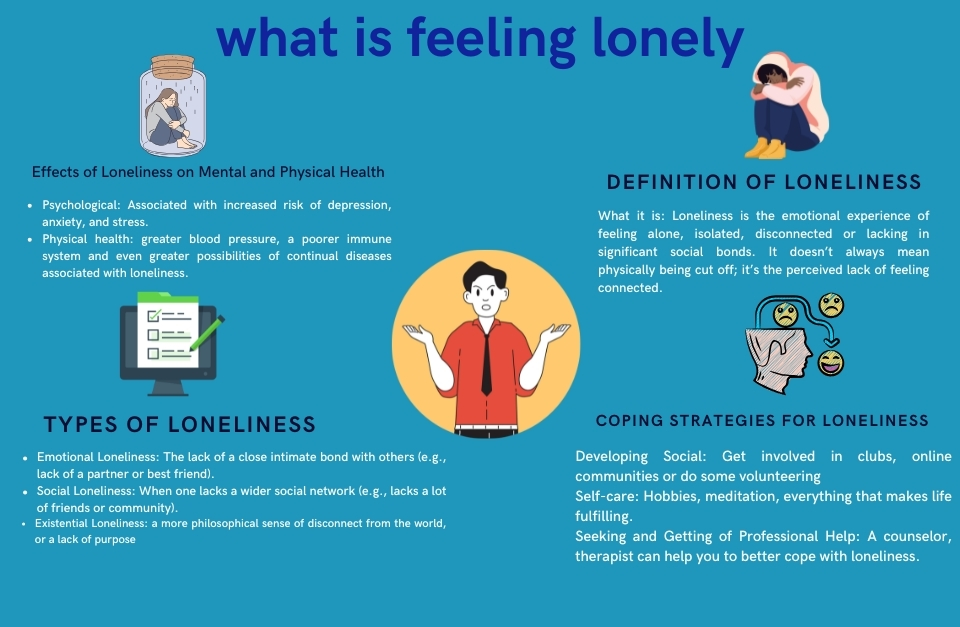Feeling lonely Discover expert tips to overcome isolation, improve emotional health, and reconnect with others through self-care, social strategies, and more. Whether it’s finding your way in a new city, grappling with feelings of isolation after getting out of a breakup, or dealing with the emotional toll that comes with living alone, loneliness can affect every facet of your experience.
Such features of modern life — that social media is currently at the center, along with busy schedules — are contributing to the increase in loneliness among young adults in particular. The silver lining, however, is that such feelings can be overcome and connections rebuilt, and emotional health maintained.
This blog explores the different causes of loneliness, how it affects mental health and includes practical tips on how to take positive steps towards resilience and hope.
Understanding Loneliness
Loneliness can be a complex experience that cuts deeper than physical isolation. You can be with people and still feel lonely. This distinction is important to address the causes correctly.
Loneliness Vs Social Isolation
Loneliness: A subjective experience of being devoid of meaningful social connection.
Social Isolation: A physical condition of having little contact with others, which can lead to but is not the same as loneliness.
Young adults tend to face loneliness during major life transitions — moving to new cities, starting new jobs, or dealing with the emotional aftermath of (or rebound from) breakups, which can leave them feeling lonely in all three scenarios. Social media makes this worse by providing an illusion of fulfillment in others’ lives and it makes users feel lonely more acutely.
Causes of Loneliness
Life Transitions: Moving to a new location, starting college or a new job, ending a romantic relationship can all disrupt social connections.
Mental Health Conditions: Problems with anxiety or social anxiety can make socializing difficult, leading to deepening loneliness.
Social Media: Although it appears to connect us, spending too much time online can magnify feelings of disconnection.
Grief and Loss: The death of loved ones upsets attachment and can leave people what feel to be isolated for a long time.
How Loneliness Impacts Mental Health

Constant feelings of loneliness can erode not only your mood but also your Mental Health and even your physical wellbeing.
Mental Health Consequences
Depression and Anxiety: Chronic loneliness can contribute to feelings of Depression or increased anxiety.
Decreased Self-Confidence: A lack of feeling of belonging can cause self-doubt and less value in ourselves.
Self-fulfilling Predictable Cycle: Lonely people become withdrawn which perpetuates the loop.
The Science of Loneliness
Loneliness can persist over time, activating Stress responses in the brain that can create chemical imbalances in neurotransmitters like serotonin and dopamine, crucial in keeping the mood uplifting. In the long term, this can have a deleterious effect on cognition and on emotional regulation and, even, physical health, if stress hormones such as cortisol are consistently high.
Then there is the role of attachment theory, which describes how periods of disconnection can inflict emotional wounds that make it harder to establish secure relationships.
Expert Insight: The psychologist Dr. John Cacioppo, a pioneer in loneliness research, defines it as a signal (like hunger or thirst) that you need to fix your Emotional health care with connection.
Is It Normal to Feel Lonely?
Loneliness is a normal and essentially human emotion that can impact people throughout life. It is necessary to understand that feeling sad or alone from time to time is a usual reaction to life passing around us and not an indication of failing or weakness.
Loneliness may be caused by a range of factors, whether that’s life transitions, social isolation or acute shifts in relationships. Realizing that loneliness is a part of the human experience can help normalize these feelings and find some self-compassion as you work through your isolation. Keep in mind that you are not the only one dealing with loneliness, and there are ways to help you deal with and conquer it.
what is feeling lonely

Loneliness is more than physical solitude it’s an emotional experience of being unfulfilled or disconnected from significant others. You can be with a group of people and still feel lonely because it’s about the quality of those connections, not the quantity. That’s different from social isolation, which is about how much social interaction someone has but doesn’t always have an emotional dimension.
Loneliness and mental healthHow loneliness can affect mental health It may amplify feelings of sadness, anxiety or self-doubt and even may cause withdrawal, creating a reinforcing cycle that’s difficult to disrupt. Over time, loneliness can also influence the way your brain responds to stress and your physical well-being, so it’s good to work on these feelings.
If you’re feeling this way, you are not alone. Loneliness is a common part of the human experience, and with the help of others, self-care and small movements toward connection, it is possible to find a way forward and hang on to a sense of belonging.
An Affirmation of Resilience Moving On
Always keep in mind that loneliness is temporary and there are means to tackle it. This article explores loneliness, tracing its origins, highlighting its effects on mental health, and offering actionable strategies to help you reclaim connection and build resilience in your life. Keep in mind self-care, connect with others,
How to Handle Loneliness Coping Skills
You don’t have to be a victim to loneliness. Here are some practical ways to reconnect with yourself and others.
Cultivate Deep Social Relationships
Participate in Support Groups or Community Circles: Everyone loves community. Meetup or some local volunteering opportunities to get you started could help.
Rekindle Necessary Relationships: Are you feeling a void in your relationships? Reconnect with old pals or request companions to resurrect current relationships.
Make Time for Self-Care Activities
Mindfulness: Meditation and positive psychology techniques ground your emotional wellness.
Behavioral Activation: Instead of isolating yourself and seeking solace in substance abuse, could you do something meaningful to you?
Be kind to yourself: This is a journey. Loneliness is not a character defect — it’s an innate cue to course-correct and connect.
Seek Professional Support
You may sometimes need an external guide for your mental problems.
- Consider online therapy or services like BetterHelp for easy access to professional help.
- Try CBT (Cognitive Behavioral Therapy): This focuses on the connection between your thoughts and your complications galore and your bank account and helps you to turn negative thoughts around.
Use Technology to Help Keep in Touch
Mental health apps: Apps like Wysa or Calm provide you with resources like chatbots, guided meditation, and journaling prompts.
Virtual Communities: You can also join online spaces created around common interests, such as hobbies or wellness efforts.
Volunteering and Activism
Giving back when you are in a bad place can cause a profound change in your disposition and remind you that we are all connected. Develop brotherhood and upliftment.gson목적олит Now you can volunteer at them. You can also go and work with mental blood, develop brotherhood and upliftment.
Engage in Reflecting Writing and Thankfulness
Journaling and being grateful allow us to take stock of what we do have, rather than what we thought we would have, helping us build emotional resilience over time.
Loneliness in a Relationship
Loneliness can also seep in when we are in the relationship. It is worth noting that being partnered does not equate to immunity from isolation. However, Cause or the reason behind the feeling of loneliness in a relationship can be countless.
It is important to communicate about these feelings with your partner, by sharing your emerging needs and seeking solutions for spending more time together focused on intimacy and connection. Professional support, like couples therapy, can also offer guidance and strategies for getting through this challenging time.
So keep in mind that relationships can also feel lonely sometimes but, with open communication and a willingness to see from each others eyes, it can also be the way to create even more glue and strength to each other and this period.
Form Healthy Connections and Take Care of Yourself

Being lonely is hard, but it’s also something you can work through with the right strategies and attitude. You can find emotional balance and once again enrich your life through understanding its root causes, attaining self-care, using community support and relaying on mental health resources such as therapy or mindfulness apps.
Ready to get moving? Tell us your loneliness stories in the comments, or share your favorite tips for feeling connected and staying resilient. Your story could help another person Feeling lonely at night or struggling after a big transition.
If you need professional help, contact mental health helplines or seek psychotherapies. And remember, you’re never really alone — there’s an entire support system behind you wishing for your recovery.
[Need resources? Explore our directory of mental health support services or download a mental health app to help you start today.]
Empowerment as a Solace Against Loneliness
Loneliness is not something to be ashamed of; instead, it should be used as an opportunity for growth. Those who push through those sensations come out the other side stronger with more emotional intelligence, stronger relationships, and more gratitude for community and connection.
Stories of Resilience
Consider Maria, who, following long-lasting loneliness post-breakup, joined a grief support group. The friendships she formed there aided her recovery and inspired a love of charitable work.
Or Tom, who drew on his experience of being lonely as a single dad to find communities online. From that, Tom restored a new life with new friends and a better sense of well-being.
Take every step you need to take towards the life you deserve — the life that has love, support, and useful connections.
Why Do I Feel So Alone?

It can come from a multitude of cause and conditions, and it’s important to heart the case and investigate the emotion in order to be able to deal with it. Here are some common reasons that may cause people to feel alone:
- We’re Lonely: Unfriendliness: Having little friends or difficulty with the socialisation process makes people feel gloomy. You have to actively promote your relationships and look for ways to interact with people.
- Life Changes: Major life events alone — like relocation, job transition or a breakup — can fracture the social networks we’ve built and foster feelings of loneliness. Understanding how these transitions impact us and who can help when we need it most can reduce loneliness.
- Social Anxiety: People with social anxiety fear being judged or rejected by others, which can prevent them from engaging in social activities and forming bonds. Therapy, or support groups, can be helpful for some to view themselves differently and manage social anxiety.
- Isolation: Whether by choice or circumstance physical isolation can lead to loneliness. Staying connected to others is one of the most important things we can do right now, if we have to use technology to do it, or reach out to other communities even if we are not one of them,
- Paucity of Emotional Support: Such intense feelings of loneliness when there isn’t an emotional support through friends, family or significant other. Therapists or counselors can offer valuable guidance and support during such trying times.
Just know that loneliness is a very normal thing and that you are not alone in feeling this way. Contact family, friends, or support groups, and be proactive in creating connections.
If I Am Not Alone, Why Do I Feel Alone?
It is confusing and frustrating to be surrounded by people, yet be lonely. We need to understand that loneliness is not just a matter of how many people are around us. Here’s why you may feel alone even when you really aren’t:
Isolation: Finding oneself isolated from others can be isolating. It does not only refer to social distance and physical distance, but it also means how deep the relationship and emotion connection are.
Expectations Not Being Met: This is another common reason why we might feel bored. This gap between fantasy and reality can exacerbate feelings of isolation.
Self-Comparison: In the era of social media, it is extremely easy to compare yourself with others, either physically or mentally, which leads one to feel feeling inadequate or isolated. Witnessing others engaged in fulfilling, happy relationships can intensify our own feelings of isolation.
And just like external barriers can prevent social connection, so too can internal barriers: low self-esteem, social phobia, or previous rejection experiences can form walls that shut us off from interacting with others, leading to isolation.
Some will cheer, some will shed tears, and some may even find themselves questioning why. That alone isn’t indicative of your value or worthiness as a person. Recognising these feelings and finding help, either in the form of therapy, support groups, or trusted and close confidantes will be the first steps in trying to find methods to foster the meaningful relationships that will counter the loneliness.
why do i feel lonely when i have friends

Feeling lonely with friends is something that may be a common experience and may happen for many reasons. Here are a few possibilities
- Emotional Disconnection: You can have friends but you may not feel emotionally connected or understood by your friends. When the emotional availability we need is at odds with what we are receiving from those in our lives, loneliness can bubble to the surface.
- Unmet Expectations: 507 more to go ← All Good Things Come to an End →Why Do Friends End? In one sense, when we have more tailored preferential roles that a platonic relationship beats, and we long for them not fulfilled, we may fall into acute loneliness.
- Friendships Are Dynamic: Relationships thrive at different stages, and such is the case with friendships. Distance, life stage, and the nature of priorities all affect the amount of time and quality of engagement with friends, which causes some to feel lonely.
- Internal Factors: Internal factors such as insecurities, self-doubt, or negative self-perception can lead to such a sense of loneliness while being surrounded by friends. This is how these internal walls prevent us from accessing the others, so laying the ground of the sense of isolation.
- Remember Quality over Quantity: The more friends you have may not necessarily mean you feel connected. It isn’t necessarily the number of friends but Rather the quality of relationships that makes a difference.
Feeling lonely in a room full of friends can be a unique pain, but you are not alone in feeling it; it is a known phenomenon. [Read: The fact you feel lonely is not the issue: try explore what has made you feel like this, get support, and know yourself better to deal with this complexity.] Be reminded, that it is entirely fine to depend on others little bit, whenever you feel an urge to ask help.

